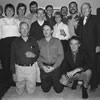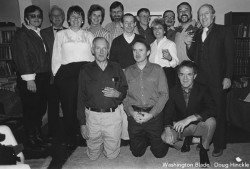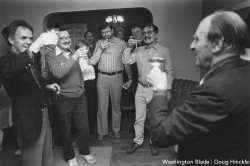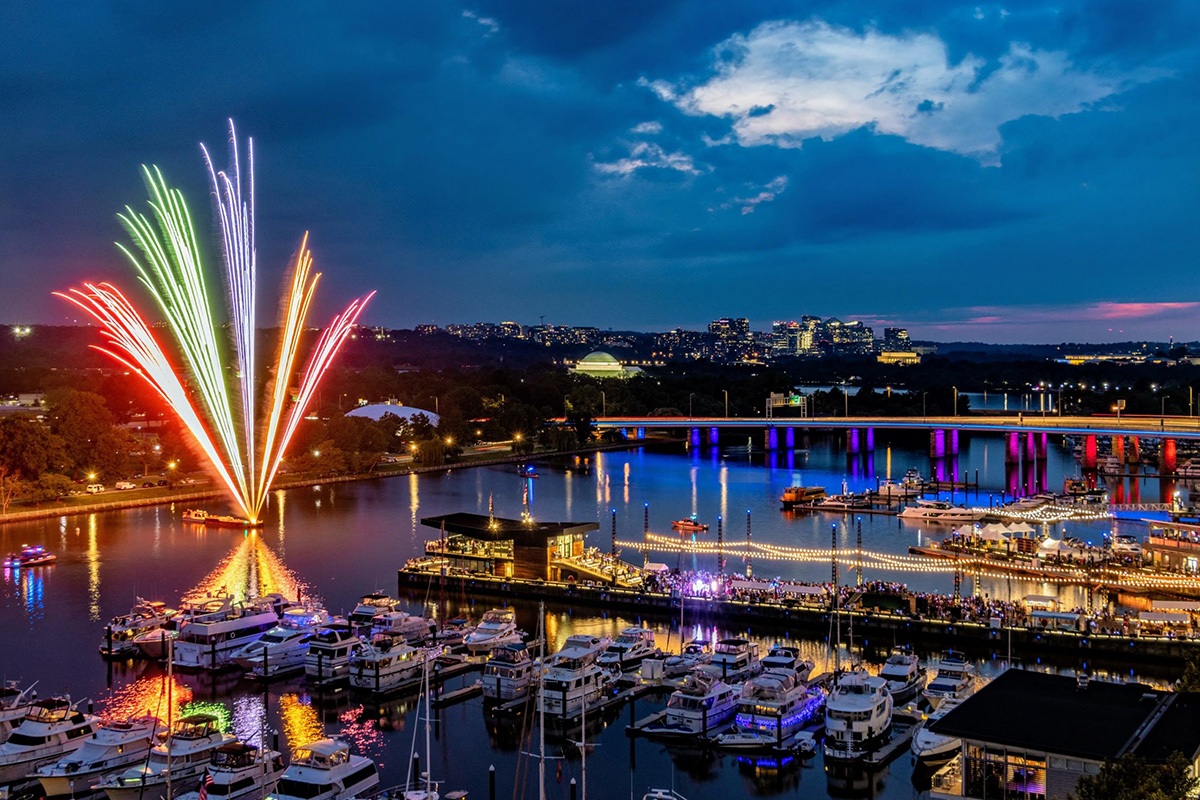Local
Mattachine founded 50 years ago
D.C. ‘homophile’ group remembered as first civil rights organization for gays


Frank Kameny, one of Mattachine’s founders, died last month, just prior to the organization’s 50th anniversary. The city staged a farewell for Kameny last week a the Carnegie Library. (Washington Blade file photo by Doug Hinckle)
Records kept by the late gay rights pioneer Frank Kameny show that Kameny and fellow activist and native Washingtonian Jack Nichols co-founded the Mattachine Society of Washington, D.C., on Nov. 15, 1961 as the city’s — and nation’s — first homosexual civil rights organization.
Kameny, then 36, and Nichols, 23, were joined by at least three others on that day at the group’s first official meeting, held in the Harvard Street, N.W., apartment of Earl Aiken, one of the group’s first members, according to information obtained by D.C.’s Rainbow History Project.
LGBT activists and Kameny’s friends and colleagues in D.C. and across the nation are scheduled to gather in Washington at the Cannon House Office Building on Capitol Hill next Tuesday, Nov. 15, for a memorial service celebrating Kameny’s life and legacy. The gay rights leader died at his home in Washington on Oct. 11. Organizers say the gathering will also commemorate the 50th anniversary of Kameny and his gay rights colleagues’ founding of the Mattachine Society of Washington.
The Rainbow History Project reports that an example of the hostile climate the fledgling group was to face in its first few years of existence in the early 1960s surfaced three months before its official launch, when Kameny organized a preliminary meeting to discuss the need for forming a homosexual rights group.
When Kameny and others sat down at the start of that meeting, held at the Hay Adams Hotel on Aug. 1, 1961, Kameny quickly discovered the gathering had been infiltrated by Louis Fouchette, the head of the Perversion Section of the D.C. Police Department’s Morals Division.
“Fouchette was identified, exposed, and left the meeting,” Rainbow History Project reports in one of its papers on the Mattachine Society of Washington.
Kameny told the Blade years later that he and others attending the August 1961 meeting viewed Fouchette’s visit, and the fact that he learned of plans to form a gay group before it even held its first meeting, as a chilling reminder of the work that lay ahead for the group.
In part because Mattachine’s organizers knew that discovery by authorities, including police, of someone’s status as a gay person would almost certainly lead to the loss of their job, the group adopted a bylaw making it mandatory that all members except Kameny use a pseudonym to identify themselves publicly. The pseudonyms would also be used on Mattachine’s membership list.
Among those complying with this requirement were Mattachine members Nichols, who later went on to become an accomplished author, journalist and out gay activist; Robert King, Lilli Vincenz, Paul Kuntzler, Eva Freund; Ron Balin; and Jon Swanson, according to Rainbow History’s reports on the group.
Each of them played a key role in Mattachine Society of Washington’s groundbreaking work, including the group’s first-ever homosexual rights protest demonstrations in the 1960s at the White House, Pentagon, Civil Service Commission and other government buildings.
Kuntzler later co-founded the D.C. Gay Activist Alliance, which later became the Gay and Lesbian Activists Alliance, and the Gertrude Stein Democratic Club, two of D.C.’s leading LGBT advocacy organizations that continue to operate today.
Back in 1961, Kameny chose to use his real name in connection with the Mattachine Society of Washington because he already suffered what he believed to be the irreversible consequences surrounding his firing in 1958 from his job as a civilian astronomer at the U.S. Army Map Service after authorities discovered he was gay.
“He knew he was essentially blacklisted for life in his profession as an astronomer, where, at the time, everybody knew each other in that profession,” said author and Kameny biographer David Carter. “So he had nothing to lose.”
Carter, who interviewed Kameny extensively during the past several years, said Kameny told him he chose to be one of the few “out” gays at the time following his unsuccessful but highly acclaimed appeal of his firing to the U.S. Supreme Court.
Kameny wrote his own brief to the high court as a document known as a Petition for a Writ of Certiorari, which asked the court to take on his case. In 1961, the Supreme Court denied his petition and upheld a lower court decision that refused to back a Kameny lawsuit seeking to force the U.S. Civil Service Commission to overturn his firing.
The lawsuit and his petition to the Supreme Court marked the first known time a gay person had challenged the U.S. government policy of refusing to hire and automatically firing gay people from federal government employment in any capacity or position.
Kameny’s 61-page Supreme Court petition, which is now part of the Kameny Papers collection at the Library of Congress, is viewed today by historians as the first comprehensive gay rights manifesto in the United States.
Carter, who is writing Kameny’s biography, said the Supreme Court petition became the founding principles used by Mattachine Society of Washington to carry out its work calling for equality and non-discrimination for homosexuals in employment and a wide range of other areas.
Origin of ‘Mattachine’ name

Local activists commemorate the 25th anniversary of the founding of the Mattachine Society on Nov. 15, 1986. (Blade archive photo by Doug Hinckle)
There were other Mattachine Society groups created by gays in other cities beginning in Los Angeles in 1950. But nearly all of them acted as clandestine groups seeking to promote a better understanding of homosexuals, with most agreeing with the then prevailing view by psychiatric professionals that homosexuality was a mental disorder.
The Mattachine name was first adopted in 1950 by pioneering gay rights activist Harry Hay, the lead founder that year in Los Angeles of the first such group. Hay said he took the name from a French medieval and renaissance group known as Société Mattachine, which operated within the royal court as court-jester type figures wearing masks to conceal their identity. In some cases the Mattachines were believed to have been given liberty to speak frankly to the ruling monarch on matters that others were forbidden to discuss.
Carter said Kameny favored using another name for the Washington group that boldly used the word homosexual in its title. He said Kameny told him he was outvoted by the other members, who thought “Mattachine” was a name widely recognized within the nation’s homophile movement.
While insisting on adopting Mattachine Society as its name, Carter and others familiar with the group said the members agreed to Kameny’s request that it remain independent of other Mattachine Society groups, with whose philosophy and tactics Kameny disagreed.
None of the other Mattachine Society groups, including those located in L.A., San Francisco, and New York, took on the role of a civil rights and civil liberties organization like the Mattachine Society of Washington did.
“They certainly were the first to take that position,” said Carter, in discussing Mattachine Society of Washington’s activist, civil rights stance. “And the second unique thing about them is their attitude or strategy. They took a militant approach toward achieving that goal, an unapologetic approach,” he said.
“It is time that a strong initiative be taken to obtain for the homosexual minority – a minority in no way different, as such, from other of our national minority groups – the same rights, provided in the Constitution and the Declaration of Independence, as are guaranteed to all other citizens,” the Mattachine Society of Washington said in an August 1962 statement.
“These include the rights to the pursuit of happiness and to equality of opportunity; the right, as human beings, to develop and achieve their full potential and dignity; and the right, as citizens, to be allowed to make their maximum contribution to the society in which they live – rights which Federal policy and practice now deny,” the statement says.
In what Carter and others following the LGBT rights movement say was a first of its kind development, the group launched a four-point campaign in 1962 calling for repeal of the U.S. Civil Service Commission’s policy barring gay employees, which it called unconstitutional; an end to the U.S. military ban on gay service members; an end to the federal government policy of denying security clearances for gays; and the repeal of state sodomy laws that made it illegal for consenting adults of the same sex to engage in private sexual relations.
Kuntzler said the group went one step further by taking what others in the homophile movement at the time considered a radical action. Following a heated debate among its members at an April 1965 meeting, Mattachine Society of Washington adopted a formal resolution declaring that homosexuality was not a mental disorder.
The resolution, introduced by Kameny, opened the way for the group to begin a national campaign to pressure the American Psychiatric Association to remove homosexuality from its diagnostic manual as a disorder.
Kuntzler said he recalls members voted 27 to 5 to approve the resolution, with the group’s then president, Bob Belanger among those who voted against it.
“The Mattachine Society of Washington takes the position that in the absence of valid evidence to the contrary, homosexuality is not a sickness, disturbance or other pathology in any sense but is merely a preference, orientation, or propensity on par with and not different in kind from heterosexuality,” the resolution states.
Kuntzler also recalled that the group got an unexpected flurry of publicity in the summer of 1963 when then U.S. Rep. John Dowdy (D-Texas), who chaired the House committee overseeing D.C. affairs, called a public hearing on a bill he introduced to curtail the activities of the Mattachine Society of Washington.
The Washington Post reported in an Aug. 10, 1963 story that Dowdy became outraged when he learned that a D.C. government agency had granted Mattachine a license to solicit charitable contributions in the city as a fundraising tool. The Post story said Dowdy’s bill called for overturning the city’s approval of the group’s charitable solicitation license and called for barring the city from approving any future license to any organization whose existence threatened to harm “the health, welfare and morals” of the city.
Kameny drew widespread media coverage when he testified at the hearing in opposition to the bill and challenged Dowdy’s assumptions that homosexuality was a “perversion” harmful to society. A representative of the D.C. chapter of the American Civil Liberties Union also testified against the bill, saying it was unconstitutional because it would infringe on Mattachine’s First Amendment right of freedom of expression.
Kuntzler said that much to Dowdy’s horror, the testimony by Kameny and the ACLU official resonated with the public and media, prompting a Post editorial opposing the bill and calling Dowdy a “moralist.”
The bill eventually died in committee. The brouhaha surrounding its introduction and the hearing helped to boost the Mattachine Society’s message of equality and non-discrimination for gay people, Kameny and other members of the group concluded at the time.
The Mattachine Society of Washington became less active following the Stonewall riots in New York in 1969, which was considered a momentous development in the gay rights movement that led to the creation of a plethora of other gay groups, including D.C.’s short-lived Gay Liberation Front.
According to Kuntzler, nearly all of Mattachine’s small corps of remaining members devoted their time and energy in 1971 to Kameny’s historic run as the nation’s first known openly gay candidate for Congress. Kameny became one of five candidates competing for the newly created non-voting delegate seat in the House of Representatives to represent D.C. in Congress.
Mattachine members, among other things, organized a first-of-its-kind “gay” questionnaire for each of the candidates running in the race, asking them to state their views on gay-related issues, including whether they would support legislation to ban discrimination against homosexuals in employment.
All but Kameny ignored the questionnaire, Kuntzler said. But he said the questionnaire and the election-related work performed by Mattachine members laid the groundwork for the type of gay rights work assumed by the Gay Activists Alliance, which formed as the recognized successor to Mattachine Society of Washington immediately following Kameny’s run for Congress.
Kameny finished fourth in the election, receiving 1,888 votes or 11 percent of the total, Kuntzler recalls. In a development that surprised many and delighted LGBT activists, Kameny finished ahead of the Rev. Douglas Moore, the fifth place candidate who denounced homosexuality and gays as being “immoral” and a threat to the community.
“It was a very nice place to be,” said lesbian activist Lilli Vincenz, who said she joined Mattachine Society of Washington in 1962 after being discharged from the Women’s Army Corps, or WACs, on grounds of homosexuality. “I was glad to be a part of it.”
Vincenz was among many of the group’s early members who went on to successful professional careers in the D.C. area while they continued to participate in the LGBT rights movement. All of them switched to using their real names.
Eva Freund, who, like Vincenz and Mattachine member Nancy Tucker, became among the group’s first female members, continued to participate in LGBT-related causes. She currently serves as president of a D.C.-area information technology services company.
Vincenz received a doctorate degree in psychology and operated a therapist practice specializing in helping lesbian and gay clients. Kuntzler became an advertising executive for a non-profit association and his longtime domestic partner, Steven Miller, who also participated in Mattachine activities, became the owner of a successful court reporting business.
Tucker and Vincenz also became coordinators of a Mattachine newsletter project that led them to found an independent gay newspaper in the city in October of 1969 called the Gay Blade, which later evolved into the Washington Blade.
District of Columbia
LGBTQ budget advocates fight for D.C. resources in a tough fiscal year
‘Trying to preserve life-saving services’ amid $1 billion cut

The months and days leading up to June are especially busy for LGBTQ Washingtonians. For one group, the DC LGBT Budget Coalition, which works year-round to ensure LGBTQ residents are represented and financially supported by the D.C. government, this time of year is their Super Bowl. Beginning in April, the D.C. Council and Mayor’s Office hold budget hearings for the next fiscal year.
With D.C.’s budget now under review, the Washington Blade spoke with Heidi Ellis, coordinator of the DC LGBT Budget Coalition, about the group’s top priorities and their push to ensure continued support for queer communities.
“The LGBTQ Budget Coalition was founded in 2020 at the height of the pandemic, as a way for the community to work together to advocate for key funding and policy changes,” Ellis said. “We recognized we were stronger together. A lot of groups are often pitted against each other for resources and dollars. This coalition was founded out of a need for unity. Since then, we’ve successfully advocated for more than $20 million in dedicated LGBTQ investments.”
In addition to coordinating the coalition, Ellis is the founder and CEO of HME Consulting & Advocacy, a firm that helps build coalitions and advance policy initiatives that address intersectional issues in the LGBTQ community. One of its most powerful tools, she explained, is direct outreach through community surveys.
“We actually do community surveys to see what people need and what’s top of mind,” Ellis said. “Of course, we also pay attention to the broader political landscape — like the current threats to HIV funding. That helps us prioritize.”
Because the coalition is comprised of more than 20 organizations across various sectors —healthcare, housing, community organizing — Ellis said its diversity enables it to connect grassroots needs to potential policy solutions.
“Our coalition includes service providers, community groups, health and housing advocates-folks who are deeply plugged into what’s happening on the ground,” she said. “They help determine our direction. We know we don’t represent every queer person in D.C., but our coalition reflects a wide range of identities and experiences.”
The insights gathered through those surveys ultimately inform the coalition’s annual budget proposal, which is submitted to the Council and mayor.
“That’s how we got to our FY26 priorities,” she said. “This year, more than ever, we’re fighting to protect what we’ve already secured — funding and policies we’ve had to fight for in the past. We know there’s concern around this budget.”
One of the challenges this year is that the D.C. government’s operating budget and some of its legislation must be approved by Congress. With a projected decline in tax revenue and a Republican-controlled Congress that has historically opposed LGBTQ funding, the Coalition has had to think strategically.
“Even before the situation on the Hill, the CFO projected lower revenue,” Ellis said. “That meant cuts to social programs were already coming. And now, with the $1 billion slashed from D.C.’s budget due to the continuing resolution, we’re not only fighting for D.C.’s budget and autonomy, but also trying to preserve life-saving services. Our message is simple: Don’t forget about queer people.”
This year’s proposal doesn’t include specific dollar figures. Instead, the Coalition outlines five funding priority areas: Healthcare, Employment & Economic Equity, Housing, Safety & Community Support, and Civil Rights.
Why no exact amounts? Ellis said it’s because not all solutions are financial.
“Some of our asks don’t require new funding. Others build on existing programs-we’re asking whether the current use of funds is the most effective. We’re also proposing policy changes that wouldn’t cost extra but could make a real difference. It’s about using what we have better,” she said.
When drafting the proposal, the Coalition tries to prioritize those with the most pressing and intersecting needs.
“Our perspective is: If we advocate for the most vulnerable, others benefit too,” Ellis said. “Take LGBTQ seniors. Some may have done well in life but now face housing insecurity or struggle to access affordable healthcare. Many in our coalition are elders who fought on the frontlines during the AIDS epidemic. They bring critical historical context and remind us that Black and brown communities bore the brunt of that crisis.”
“I love our coalition because it keeps us accountable to the moment,” she added. “If we center those most marginalized, we can make an impact that lifts everyone.”
In addition to healthcare and housing, safety remains a top concern. The Coalition has fought to maintain funding for the Violence Prevention and Response Team (VPART), a city-supported group that includes MPD, community-based organizations, and the Mayor’s Office of LGBTQ Affairs. VPART responds to crimes affecting the LGBTQ community and connects victims to legal, healthcare, and housing services.
“We’ve pushed to make VPART more proactive, not just reactive,” Ellis said. “The funding we’ve secured has helped survivors get the support they need. Cutting that funding now would undo progress we’re just beginning to see.”
At the end of the day, Ellis emphasized that this process is about far more than spreadsheets.
“A budget is a moral document,” she said. “If we’re not represented, you’re telling us our lives don’t matter at a time when we need protection the most. When people can’t get food, medicine, housing — that has a devastating impact. These are vital services.”
The DC LGBT Budget Coalition is urging residents to support a letter-writing campaign to D.C. Council members and the mayor. You can send a letter here: https://actionnetwork.org/letters/fully-fund-dcs-lgbtq-communities
Read the full FY26 budget proposal here: https://drive.google.com/file/d/1bTrENnc4ZazJTO6LPrQ3lZkF02QNIIf1/view
Arts & Entertainment
Washington Blade’s Pride on the Pier returns bigger than ever with two-day WorldPride celebration

The Washington Blade’s Pride on the Pier will be extended to a two-day celebration in honor of WorldPride coming to D.C. this year. Taking place on Friday, June 6 and Saturday, June 7 at The Wharf, this year’s event promises more entertainment, more community, and more pride than ever before — all set against the stunning waterfront backdrop of our nation’s capital.
With the addition of Friday, the party kicks off at 3 p.m., with the inaugural WorldPride Boat Parade at 7 p.m. As an Official WorldPride Partner event, the boat parade will feature 30 decorated boats parading along the Washington Channel. For information on signing up for the boat parade contact Stephen Rutgers at [email protected].
Saturday’s signature Pier Party kicks off at 12 p.m., featuring a drag show, DJ’s, streaming of the WorldPride Parade, and the iconic Fireworks Show Presented by the Leonard-Litz Foundation — one of D.C. Pride’s most anticipated spectacles.
“We’re expanding Washington Blade Pride on the Pier to reflect the excitement and momentum building for WorldPride in D.C.,” said Blade publisher Lynne Brown. “It’s a celebration of our community’s progress and a powerful reminder of the joy and visibility Pride brings to the heart of our city.”
Now in its seventh year, Washington Blade Pride on the Pier extends the city’s annual celebration of LGBTQ visibility to the bustling Wharf waterfront with an exciting array of activities and entertainment for all ages. The District Pier will offer DJs, dancing, drag, and other entertainment. Alcoholic beverages will be available for purchase for those 21 and older.
Pride on the Pier is free and open to the public, with VIP tickets available for exclusive pier access, hosted bars, and private viewing areas for the boat parade and the fireworks show. To purchase VIP tickets visit www.prideonthepierdc.com/vip.
Friday VIP: 5-9 p.m., enjoy an air-conditioned lounge, private bathroom, cash bar and complimentary drink.
Saturday VIP Session #1: 2-5 p.m., enjoy an air-conditioned lounge, private bathroom, catered food, and an open bar.
Saturday VIP Session #2: 6-9 p.m., enjoy the air-conditioned lounge, private bathroom, catered snacks and dinner, and open bar with a front-row view of the fireworks.
Event Details:
📍 Location: District Pier at The Wharf (101 District Sq., S.W., Washington, D.C.)
📅 Dates: Friday, June 6 & Saturday, June 7, 2025
🛥️Boat Parade: 7 p.m. (June 6). 🎆 Fireworks Show: 9 p.m. (June 7)
🎟️ VIP Tickets: www.PrideOnThePierDC.com/VIP
Event sponsors include Absolut, Capital Pride, DC Fray, Infinate Legacy, Heineken, Leonard-Litz Foundation, Mayor’s Office of LGBTQ Affairs, Relish Catering, Washingtonian, and The Wharf. More information regarding activities will be released at www.PrideOnThePierDC.com
Maryland
Md. schools plan to comply with federal DEI demands
Superintendents opt for cooperation over confrontation

By LIZ BOWIE | Deciding not to pick a fight with the Trump administration, Maryland school leaders plan to sign a letter to the U.S. Department of Education that says their school districts are complying with all civil rights laws.
The two-paragraph letter could deflect a confrontation over whether the state’s public schools run diversity, equity, and inclusion programs that the Trump administration has called illegal. The Baltimore Banner reviewed the letter, which was shared by a school administrator who declined to be identified because the letter has not yet been sent.
Maryland school leaders are taking a more conciliatory approach than those in some other states. Education leaders in Minnesota, New York, Colorado, Oregon, Vermont, and Wisconsin said they will not comply with the federal education department’s order, the demands of which, they say, are based on a warped interpretation of civil rights law.
The rest of this article can be found on the Baltimore Banner’s website.
-

 Opinions5 days ago
Opinions5 days agoIt’s time for new leadership on the Maryland LGBTQIA+ Commission
-

 The White House4 days ago
The White House4 days agoWhite House does not ‘respond’ to reporters’ requests with pronouns included
-

 Arts & Entertainment5 days ago
Arts & Entertainment5 days ago‘Gay is Good’ Pride Pils Can Celebrates Frank Kameny’s 100th Birthday for WorldPride in D.C.
-

 Sponsored5 days ago
Sponsored5 days agoTHC Drinks: What You Should Know About Cannabis Beverages








